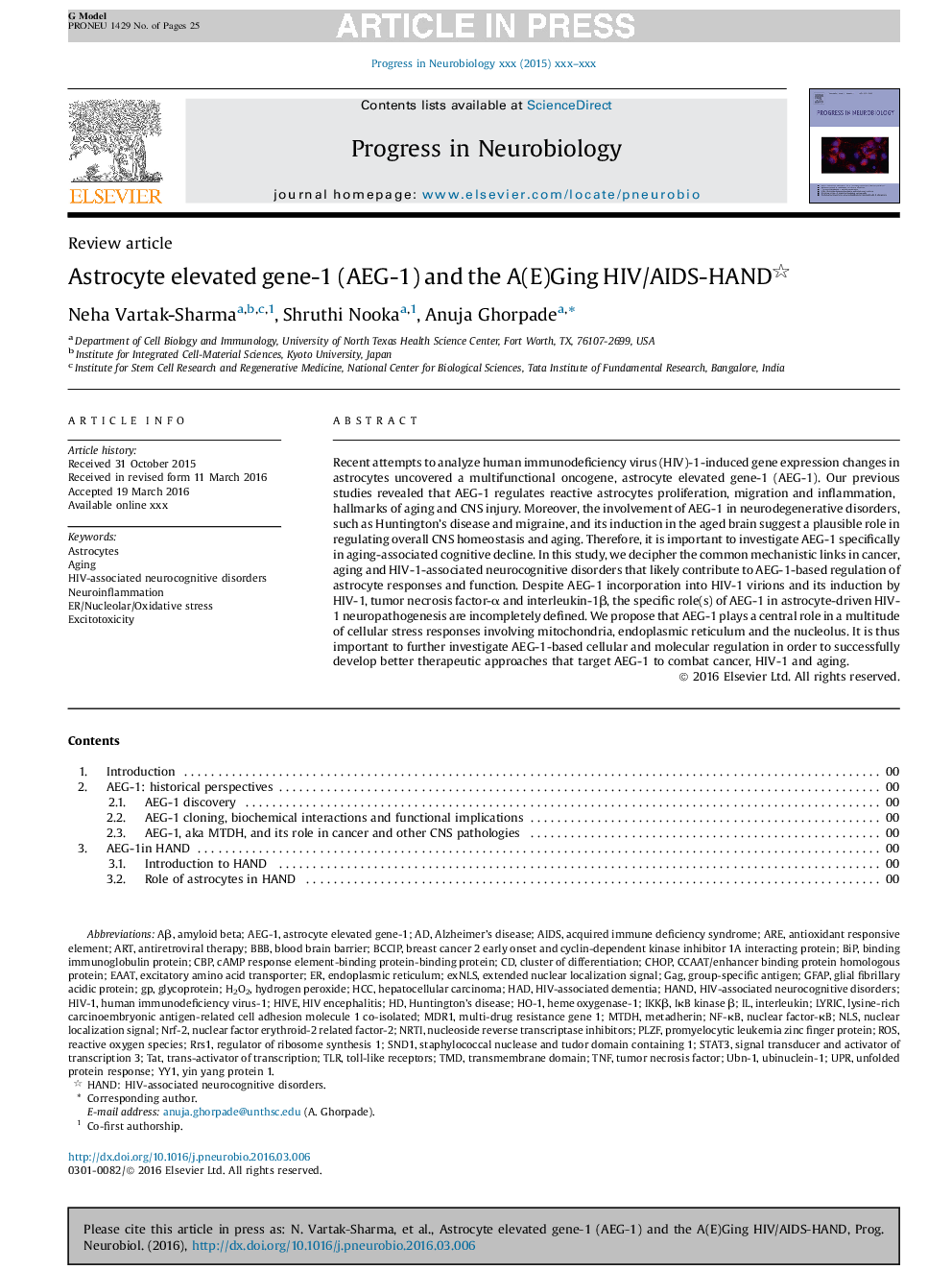| Article ID | Journal | Published Year | Pages | File Type |
|---|---|---|---|---|
| 5739069 | Progress in Neurobiology | 2017 | 25 Pages |
Abstract
Recent attempts to analyze human immunodeficiency virus (HIV)-1-induced gene expression changes in astrocytes uncovered a multifunctional oncogene, astrocyte elevated gene-1 (AEG-1). Our previous studies revealed that AEG-1 regulates reactive astrocytes proliferation, migration and inflammation, hallmarks of aging and CNS injury. Moreover, the involvement of AEG-1 in neurodegenerative disorders, such as Huntington's disease and migraine, and its induction in the aged brain suggest a plausible role in regulating overall CNS homeostasis and aging. Therefore, it is important to investigate AEG-1 specifically in aging-associated cognitive decline. In this study, we decipher the common mechanistic links in cancer, aging and HIV-1-associated neurocognitive disorders that likely contribute to AEG-1-based regulation of astrocyte responses and function. Despite AEG-1 incorporation into HIV-1 virions and its induction by HIV-1, tumor necrosis factor-α and interleukin-1β, the specific role(s) of AEG-1 in astrocyte-driven HIV-1 neuropathogenesis are incompletely defined. We propose that AEG-1 plays a central role in a multitude of cellular stress responses involving mitochondria, endoplasmic reticulum and the nucleolus. It is thus important to further investigate AEG-1-based cellular and molecular regulation in order to successfully develop better therapeutic approaches that target AEG-1 to combat cancer, HIV-1 and aging.
Keywords
BCCIPGAGTLRUPRCBPNLSHeme oxygenase-1PLZFNRTITMDAEG-1EAATMDR1YY1IKKβNRF-2MTDHSND1LYRICMetadherinTNFTrans-activator of transcriptionSTAT3AβGFAPHO-1NF-κBBiPHCCIκB kinase βROSHydrogen peroxideAstrocytesGroup-specific antigenHIV encephalitisHIV-associated neurocognitive disordersNeuroinflammationexcitotoxicityAIDSinterleukinamyloid betaAlzheimer’s diseaseHuntington’s diseaseTATCHOPexcitatory amino acid transportercluster of differentiationHADtransmembrane domainAntiretroviral therapyHandHIV-associated dementiaAgingBBBblood brain barrieracquired immune deficiency syndromenuclear localization signalendoplasmic reticulumantioxidant responsive elementtumor necrosis factornuclear factor-κBsignal transducer and activator of transcription 3Nucleoside reverse transcriptase inhibitorsAREARTH2O2HIV-1human immunodeficiency virus-1Unfolded protein responseGlial fibrillary acidic proteinBinding immunoglobulin Proteinastrocyte elevated gene-1Hepatocellular carcinomaHiveGlycoproteinReactive oxygen speciesToll-like receptors
Related Topics
Life Sciences
Neuroscience
Neuroscience (General)
Authors
Neha Vartak-Sharma, Shruthi Nooka, Anuja Ghorpade,
